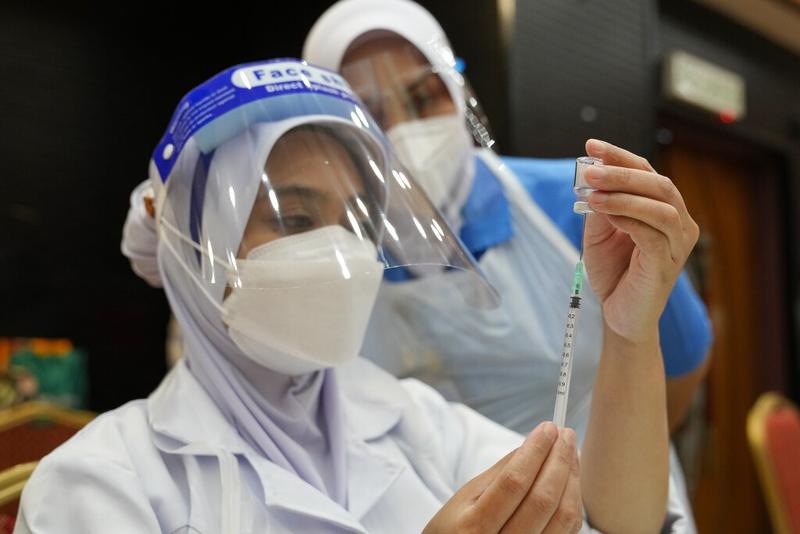 A nurse prepares a dose of the Pfizer vaccine against the coronavirus disease (COVID-19) for a secondary school student at a vaccine center in Shah Alam, Malaysia, Sept 20, 2021. (VINCENT THIAN / AP)
A nurse prepares a dose of the Pfizer vaccine against the coronavirus disease (COVID-19) for a secondary school student at a vaccine center in Shah Alam, Malaysia, Sept 20, 2021. (VINCENT THIAN / AP)
Chinese vaccines and support for vaccine research have helped Malaysia scale up its response to the COVID-19 pandemic and successfully roll out a mass inoculation drive, analysts said.
The Southeast Asian nation’s vaccination success stems from efficient management of the program, widespread information campaign and a diverse vaccine portfolio that ensures continuous supply, they said, while noting the important role played by Chinese supplies and cooperation.
Malaysia has one of the world’s highest vaccinations rates, with more than 60 percent of the population fully vaccinated as of Sept 27.
Vaccines from China’s Sinovac and the US-German consortium Pfizer-BioNTech accounted for roughly 90 percent of the over 42 million doses that have been administered in the country since the program started in February. Apart from that, Malaysia has also bought and administered vaccines developed by British-Swedish firm AstraZeneca and China’s CanSino Biologics.
Yahya Mat Arip, associate professor at the School of Biological Sciences at Universiti Sains Malaysia, or USM, a public research university based in Malaysia’s northwestern state of Penang, said that CanSino vaccines, in particular, have helped in immunizing some of Malaysia’s marginalized communities, such as the Orang Asli (indigenous people) and the homeless.
With a single dose of CanSino vaccine, one can get vaccinated and be done with it. After 28 days, the individual who received CanSino vaccine would be considered as fully vaccinated
Yahya Mat Arip, associate professor at the School of Biological Sciences at Universiti Sains Malaysia
“With a single dose of CanSino vaccine, one can get vaccinated and be done with it. After 28 days, the individual who received CanSino vaccine would be considered as fully vaccinated,” Yahya said.
READ MORE: PM: Malaysia reaches herd immunity threshold of 80%
He noted that CanSino benefits people who cannot easily access vaccines: homeless people who are always on the move and the Orang Asli who live in remote areas.
As for Sinovac vaccines, they are ideal for vaccination in Malaysia’s small villages as the jabs do not require ultra-temperature storage, Yahya said.
Chan Chee Khoon, an epidemiologist and health policy analyst with the Kuala Lumpur-based advocacy group Citizens' Health Initiative, said a partnership between Sinovac and Pharmaniaga, Malaysia’s biggest pharmaceutical company, is the “first step towards a much-needed mature manufacturing capability in Malaysia which can be re-purposed in a (future) outbreak”.
In January, Pharmaniaga entered into an agreement with Sinovac to buy ready-to-fill vaccines. Six months later, Pharmaniaga fulfilled a contract to supply the Malaysian government with 20.4 million doses of vaccines.
The Malaysian government launched its immunization program in February, with healthcare workers and other frontline personnel among the first group of people to be inoculated. The Special Committee for Ensuring Access to COVID-19 Vaccine Supply, co-chaired by the Ministry of Health of Malaysia and the Ministry of Science, Technology and Innovation, was established to ensure the timely procurement and distribution of vaccines.
There were some hiccups along the way. Supply was insufficient in the first half of the year, slowing down the pace of the vaccine rollout. Daily vaccinations in April and May barely hit 100,000 doses. This, combined with the entry of the more infectious Delta variant, has made Malaysia a hotspot for COVID-19 during the second quarter of the year.
However, vaccinations gathered speed in the third quarter, thanks to the entry of more vaccines. As many as 491,643 doses were administered on Aug 1 alone. For the month of September, the amount of vaccines administered each day ranged between 200,000 and 400,000 doses.
The adequate supply was complemented by the establishment of over a thousand centers nationwide that operate even on weekends and public holidays so that Malaysians can get vaccinated anytime and anywhere. A website and a mobile app (MySejahtera) were developed so that people could register for vaccination.
Leow Chiuan Yee, senior lecturer and principal investigator for vaccine development and immunology at USM’s School of Pharmaceutical Sciences, said the Ministry of Health has also actively promoted inoculations by using various forums, boosting public confidence in vaccines.
He added that the government was also vigilant in combating misinformation, enforcing an emergency law in March to tackle fake news related to COVID-19.
Chan, from the Citizens' Health Initiative, complimented the government’s “well-organized, ramped-up vaccine rollout”. But he is hoping that the authorities will also reach out to the estimated 4 million undocumented migrant workers who refused to get vaccinated out of fears of getting arrested and deported.
“A persistently large pool of undocumented migrant workers provides fertile ground for undetected community transmissions,” he said.
As Malaysia’s vaccination rate improves, the government has slowly begun opening up the economy. The resort island of Langkawi was reopened for domestic tourists on Sept 16. Fully-vaccinated people are now allowed to dine in restaurants, go camping and visit night markets.
ALSO READ: Malaysia charts course for COVID-19 booster jabs
Wan Suhaimie Wan Mohd Saidie, head of economic research at Kenanga Investment Bank in Kuala Lumpur, is optimistic that the economy will reopen substantially in the fourth quarter or early next year.
“We see higher growth prospects in 2022 on the expectation that the economy would be fully reopen bringing about a rise in pent up demand, as well as the normalization of the global supply chain,” he said.
Malaysia needs to balance health and livelihoods, USM’s Leow said, noting the government’s plans to roll out a booster shot campaign in October.


